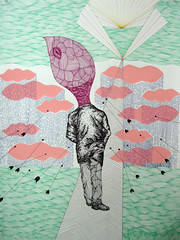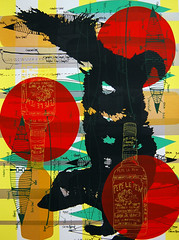 Websites: www.travisweller.com, www.yeparts.com
Websites: www.travisweller.com, www.yeparts.comEtsy: www.travisweller.etsy.com
Flickr: www.flickr.com/photos/42401209@N04
Brief Bio:
I live in San Francisco, CA, where I own and operate Yep Arts. Yep Arts revolves around screen printing. I print clothing for a number of artists here in SF, design and print posters for events, design and print my own clothing line, and print fine art serigraphs for solo and group exhibitions.
How did you get started in printmaking?
I started printmaking while I was working on my MFA in North Carolina. I started graduate school as painter, but my curiosity led me to the printmaking studio. I watched someone who was working on a serigraph and realized that I could make paintings without actually painting. I went back to my studio, started exploring screen printing, and have been doing it ever since.
Describe where you work.
I recently moved into a great space in the Mission district of San Francisco. I operate Yep Arts out of this space. It houses an exposure unit, press, dryers, drawing tables, printing tables, digital station, and office. I am very fortunate to have a work space, but it did not come without countless days of hard work in less than ideal conditions.

Before this space, I worked entirely out of my bedroom. I converted my small closet into a makeshift darkroom for coating and exposing screens. All work (paper and clothing) was printed in my room on a table with hinge clamps. I often has so much work piled on my floor and bed that I could not sleep in my room. In time, I was giving away all of my belongings to make more room for studio supplies. So now, I have a bedroom again, and I can even sleep there.
What's your favorite printmaking process?
Screen printing, all the way.
What's your creative process for any given print?
I almost always work series. The beginning of my process involves deciding on a subject to explore. Once that decision is made, I'll begin drawing a series of ideas that will eventually complete the whole thought.
What do you enjoy most about printmaking?
The process. I absolutely love the series of events that lead to a final series of prints. There are so many little parts to the process, each with equal importance. Thinking, drawing, scanning, exposing, tearing, registering, composing, printing. I get so pumped just thinking about it.

What's your least favorite part of the process?
I am not really sure that I have a least favorite part. Each step of the process is so important to the end result, I give equal attention to all. That is what keeps me so interested and involved in screen printing.
What are your inspirations (other artists, people, places, events, etc.)?
I am inspired mostly by the people in my life who make what I do possible. My family, for always allowing and encouraging me to reach for the stars; my partner, for her unparalleled support and believing in me; my professors, for giving me the freedom to explore and guidance to succeed; and my peers, for continuing to push the limits that continually make us better at what we do.

How do you get past creative slumps?
Keep working. Working through slumps can be the best method for spawning new ideas and methods. Some of my best work has come out of creative slumps, where otherwise I may not have followed through with certain concepts.
How do you promote your work?
Most of my formal promotion happens online. Through my websites, etsy, flickr, facebook, kind of the normal stuff. All of this is necessary to reach and stay connected with people all over the world. But what I most prefer is word-of-mouth. I have built Yep Arts from the ground up, mostly relying on clients and friends who have spread the word about what I do and how I do it. For me, there is no higher honor than grassroots advertising from people who respect my work ethic.

Any other comments or advice for others who want to try making hand-pulled prints?
Go for it. With a little creativity and a lot of motivation, wonderful things can happen. There is plenty of how-to information available online, in books, and community workshops. Do your research, then get to work. You will never know what is possible until you try.
No comments:
Post a Comment